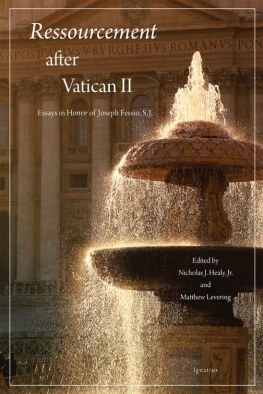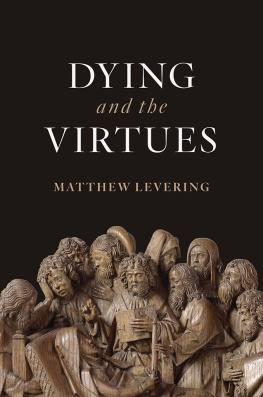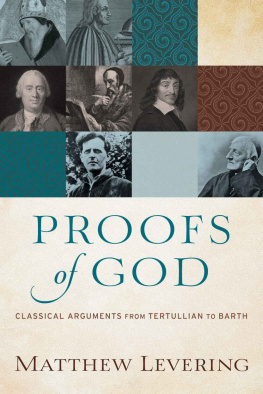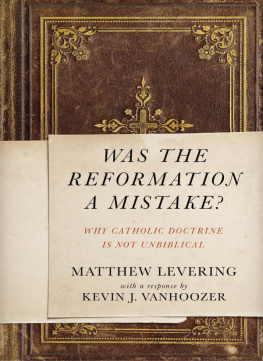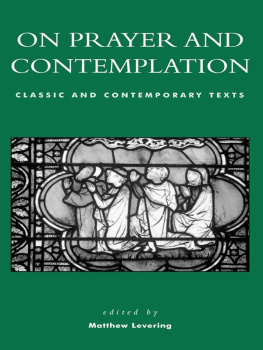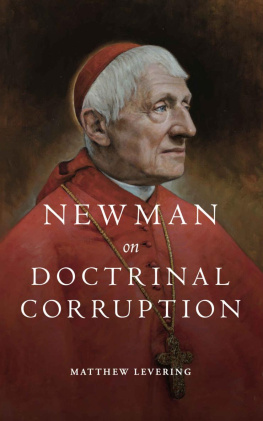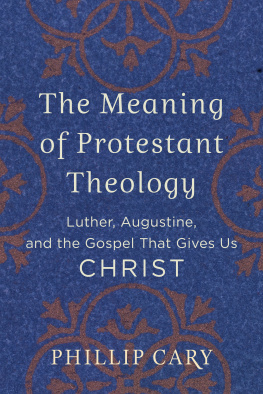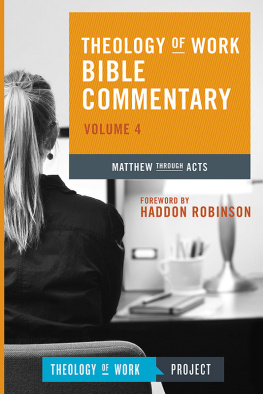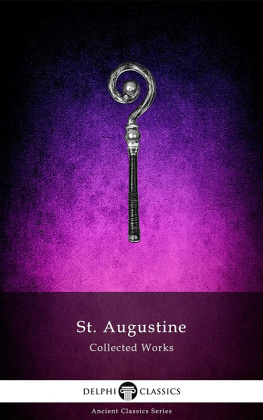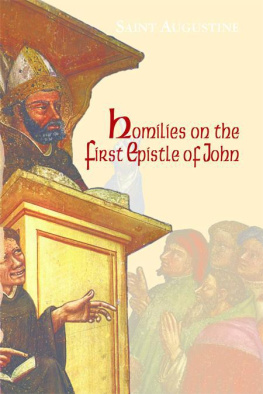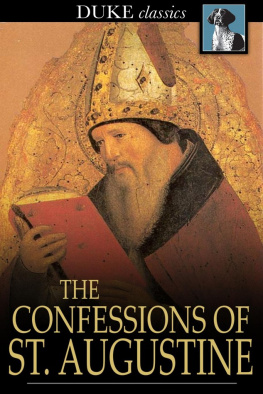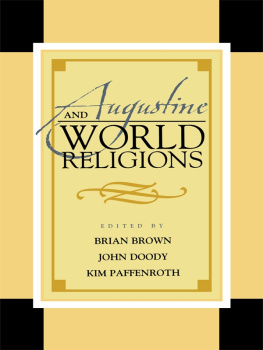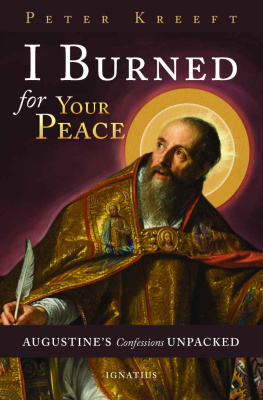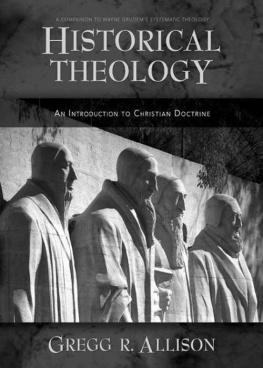
2013 by Matthew Levering
Published by Baker Academic
a division of Baker Publishing Group
P.O. Box 6287, Grand Rapids, MI 49516-6287
www.bakeracademic.com
Ebook edition created 2013
All rights reserved. No part of this publication may be reproduced, stored in a retrieval system, or transmitted in any form or by any meansfor example, electronic, photocopy, recordingwithout the prior written permission of the publisher. The only exception is brief quotations in printed reviews.
ISBN 978-1-4412-4045-3
Library of Congress Cataloging-in-Publication Data is on file at the Library of Congress, Washington, DC.
Scripture quotations are from Ignatius Presss Catholic edition of the Revised Standard Version of the Bible, copyright 1965, 1966 by the Division of Christian Education of the National Council of the Churches of Christ in the United States of America. Used by permission. All rights reserved.
Translations of the Confessions are taken from Saint Augustine: Confessions , translated by Henry Chadwick 1991 Oxford University Press. Used with permission.
Translations of On the Trinity are taken from The Trinity 1991 Augustinian Heritage Institute, published by New City Press. Used with permission.
The internet addresses, email addresses, and phone numbers in this book are accurate at the time of publication. They are provided as a resource. Baker Publishing Group does not endorse them or vouch for their content or permanence.
To David Solomon
Contents
Cover
Title Page
Copyright Page
Dedication
Acknowledgments
Introduction
1. On Christian Doctrine
2. Answer to Faustus, a Manichean
3. Homilies on the First Epistle of John
4. On the Predestination of the Saints
5. Confessions
6. City of God
7. On the Trinity
Conclusion
Notes
For Further Reading
Subject Index
Scripture Index
Back Cover
Acknowledgments
M y first thanks go to my beloved wife, Joy! She is wonderful and she makes life fun. I thank God every day for her and for our children. This book was written as a spiritual exercise during a period when I was particularly in need of Augustines wisdom. I sought out Lewis Ayres at an early stage of the project, and he graciously encouraged it. Gerald Boersma, my good friend and former student who has become an expert on Augustine under Lewiss tutelage, read the manuscript and made helpful suggestions, as did the Reformed theologian Michael Allen. Andrew Hofer, OP, a patristics scholar who has a mastery of all things theological, reviewed the manuscript twice, and without his help I dont think that the book could have come to fruition. At a crucial juncture, Scott Hahn pointed my attention to Augustines Answer to Faustus, a Manichean . A version of chapter 2 appears as Scriptural and Sacramental Signs: Augustines Answer to Faustus , Letter and Spirit 7 (2011): 91118. In November 2010 Joel Green invited me to speak to his Hermeneutics of Christian Scripture group at the Society of Biblical Literature, where I delivered an excerpt from what eventually became chapter 6. A version of this lecture was published as Linear and Participatory History in Augustines City of God , Journal of Theological Interpretation 5 (2011): 17596, for which I am grateful. At Baker Academic, Rodney Clapp, Jim Kinney, and James Ernest generously took an interest in the manuscript, and Tim West guided it through production. Elizabeth Farnsworth, an excellent doctoral student in theology at the University of Dayton, skillfully compiled the indexes. In addition to these good friends, let me mention Hans Boersma, Michael Carter, Jason Heron, Reinhard Htter, Bruce Marshall, Alan Mostrom, Michael Vanderburgh, and Thomas Joseph White, OP, who were among those whose friendship and mentoring meant so much to me during the period of writing. I dedicate the book to David Solomon, founder of the Center for Ethics and Culture at the University of Notre Dame, with gratitude and esteem.
Introduction
A ugustines friend and first biographer, Possidius, wrote that so many things were dictated and published by him and so many things were discussed in the church, written down and amended, whether against various heretics or expounded from the canonical books for the edification of the holy sons of the Church, that scarcely any student would be able to read and know them all. This is especially the case because Augustine has always been, and remains today, a controversial thinker whose insights into the realities of God and salvation can be easily misunderstood.
Setting aside the longer exegetical works such as the Literal Commentary on Genesis , On the Psalms , and Tractates on the Gospel of John , which would burst the bounds of this book,one must know these works. Even more important, one must read these works to gain an appreciation for why such a great thinker gave his life to the realities proclaimed by Christian Scripture. And, lastly, it is by reading these works that one will be able to evaluate the development and present intellectual impasse of Western civilization. Augustine speaks as powerfully today as he did sixteen hundred years ago.
My task in this book is to present these seven pivotal works of Augustine. Here we find the themes that Augustine plumbed most deeply: how to interpret Christian Scripture, the relationship between the Old and New Testaments, the unity of the Church in charity, Gods eternity and simplicity, grace and predestination, conversion, the meaning of history, the two cities, the cross and resurrection of Jesus Christ, and the divine Trinity. The first two works, On Christian Doctrine and Answer to Faustus, a Manichean , set forth the central components of Augustines theology of Scripture and of scriptural interpretation. The next two works, Homilies on the First Epistle of John and On the Predestination of the Saints , explore the grace of the Holy Spirit and the charity that unites the Body of Christ. The final three works, Confessions , City of God , and On the Trinity , form a triptych that shows how human life (individual and communal) is an ascent to full participation in the life of the Triune God, who descends in Christ and the Holy Spirit to make possible our sharing in the divine life.
Augustine wrote his longer works over a period of years. For example, City of God took around thirteen years to complete, and On the Trinity may have taken longer. Yet each of his works is a carefully orchestrated unity. It is therefore not enough simply to survey Augustines central ideas. One needs to follow the argument of each work in its entirety in order to see how the great rhetorician weaves his ideas together in the service of Christian instruction. Many introductions to Augustines theology treat his ideas on this and that topic, drawing upon a wide variety of his treatises, letters, and sermons. It seems to me more fruitful to introduce Augustines major ideas by surveying his most important works in their entirety.
In preparing this book, I have had especially in mind the needs of students and educated readers who desire an introduction to Augustine. As a reader of Scripture, Augustine helps us to avoid historicism by constantly reminding us that true interpretation of Scripture requires learning both the historical meaning of the biblical signs and their salvific referent ( On Christian Doctrine and Answer to Faustus, a Manichean ). Since Christianity is a communion of persons rather than simply an interpretation of texts, we come to know Scripture rightly in the Church, where Scripture nourishes the love of Gods people ( Homilies on the First Epistle of John ). This friendship with God and each other is not something that we can give ourselves, but is entirely Gods gift in Christ and the Spirit ( On the Predestination of the Saints ). As individuals seeking true friendship ( Confessions ) and as communities seeking true peace ( City of God ), humans have been created for union with the Triune God, who draws us to himself by knowledge and by love ( On the Trinity ). Augustine offers a pattern of biblical reading, of living the Scriptures, that invites us to enjoy friendship with the Triune God who has created and redeemed us.


